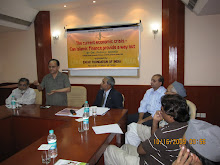A week before Passover, a local interfaith group called the Table of Abraham organized a Seder event at Congregation Ahavath Chesed, a Reform Jewish congregation in Jacksonville. The goal was to enact all of the rituals that are part of Seder as a way of informing and teaching people who are unfamiliar with this tradition.
Turning the pages of the Haggadah, I was specially struck by the similarity in both Judaism and Islam about this seminal Jewish event of Passover. At a time when so much of the contemporary narrative about Jews and Muslims is written in the context of differences and conflicts, it is useful to mark the solemn occasion of Passover as a mutual reminder about the commonalities between the faiths.
No other story in the Quran is recounted as frequently as the bondage of the Children of Israel in Egypt and their subsequent deliverance from the tyranny of the Pharaoh. God says in the Quran:
O children of Israel! Remember those blessings of Mine with which I graced you, and how I favored you above all other people; .... And [remember the time] when We saved you from Pharaoh's people, who afflicted you with cruel suffering, slaughtering your sons and sparing [only] your women - which was an awesome trial from your Sustainer; and when We cleft the sea before you, and thus saved you and caused Pharaoh's people to drown before your very eyes. (2:47-50)
The genesis of Muslim-Jewish relationship goes back to the founding of a political state in Madinah by Islam's Prophet Muhammad in 622 of the Common Era. Madinah of that time was a city inhabited by primarily polytheist Arab tribes, a few Jewish tribes and some Christians (although not as organized tribes). The Jewish tribes joined the rest of the city in welcoming Prophet Muhammad and upon entering the city the Prophet signed a treaty with all of the surrounding tribes.
This treaty is called the Charter of Madinah. It is perhaps the earliest known constitution in the world, predating the Magna Carta by 600 years. It is also the first known legal document that confers rights and responsibilities upon distinct religious minorities. It particularly recognizes Jews as a distinct nation (or ummah) entitling them to the same rights and responsibilities as any other signatories to the document. The treaty required each to assist the other another against any violation of the covenant. When placed in the context of the socio-economic-political conditions of the seventh century this document was indeed revolutionary.
Azizah al-Hibri, a legal scholar wrote:
The Charter .... declared all Muslim and Jewish tribes of Madinah to be one community. At the same time, each tribe retained its identity, customs and internal relations. The "federal" system of Madinah was responsible, however, for such matters as common defense and peacemaking, purposes similar to those in the Preamble to the American Constitution.... The Charter also contained its own partial bill of rights, ... among the rights that it protected were the right to freedom of religion, and the right not to be found guilty because of the deeds of an ally, a form of guilt by association which was widely practiced at the time.....The Charter of Madinah repeatedly emphasized the principles of fairness and equity for Jews and Muslims....It is readily apparent that there are significant parallels between the concepts expressed in the Charter of Madinah, executed in the seventh century, and those of the American Constitution, drafted in the eighteenth century.
Despite such early documentary evidence of reciprocal respect, relationship between the two communities was clouded by mutual mistrust leading to several bloody conflicts.
And yet there are also many inspiring examples of coexistence and cooperation. It was during the Muslim rule in Spain that Jewish art, philosophy and literature reached one of its golden ages. A recent documentary on PBS characterized that era as, "The fascinating story of a central bureaucracy staffed by elites from all three faiths, with Jews in all but the highest post and Christian scholars outperforming "native" Arabic speakers in their own language and culture, is a fascinating and powerful antidote to our modern stereotypes concerning Christians, Jews, and Muslims."
Which part of our shared history do we want to use as our guide to the future? The part that steers us to presume the worst stereotypes about each other or the part that shows how much we can benefit humanity through our mutual cooperation. How we reminisce the past will dictate how effective we are in building a new future.
By the end of my Seder meal at the synagogue, it was quite apparent that beneath the headlines that scream conflict are Jewish, Muslim and Christian hearts yearning to build a more hopeful future based on mutual understanding. The eternal message of hope was my take-home lesson from the Seder.
















